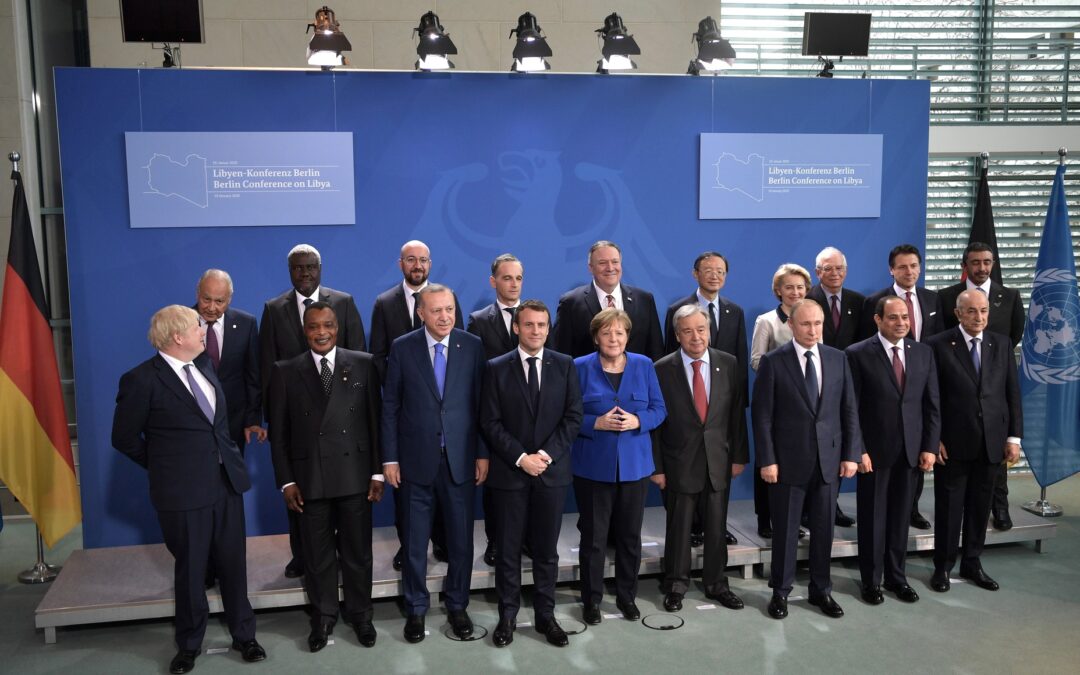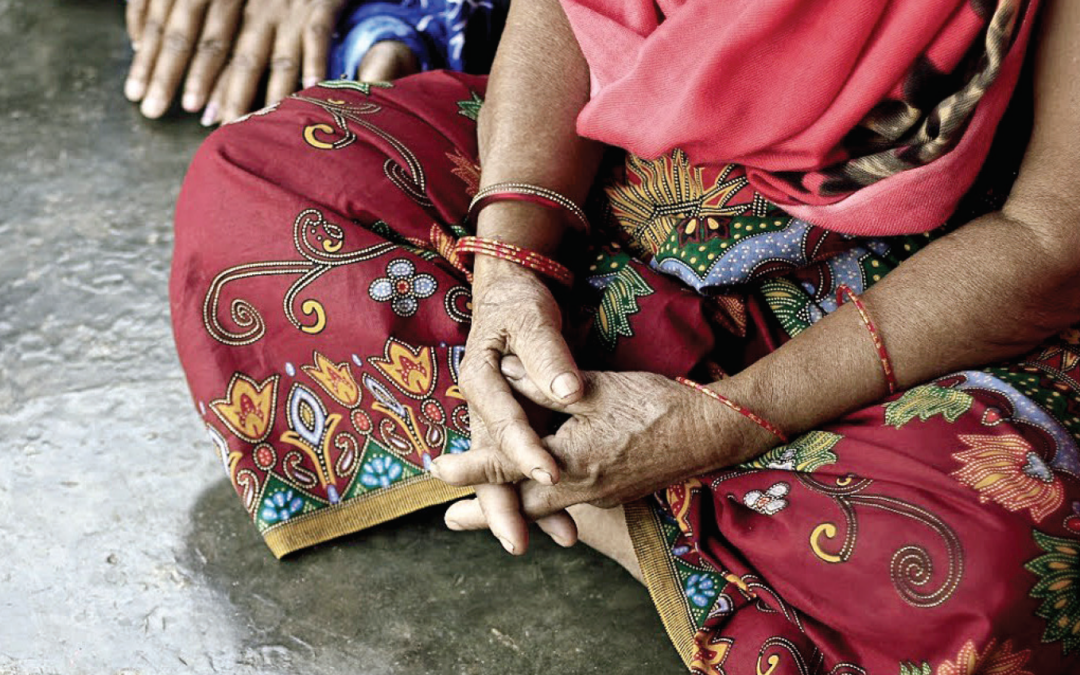
Jun 22, 2021 | News
The Second Berlin Conference on Libya, taking place on 23 June, should focus on ensuring accountability for crimes under international law and guaranteeing that the transitional justice process is fully consistent with international law and standards as its key priorities, the ICJ said today.
هذا البيان الصحفي متوفر باللغة العربية أيضاً
“The Berlin II Conference must bring accountability to the top of the political agenda in Libya”, said Saïd Bernarbia, the ICJ MENA Director.
“The necessity to hold the 24 December elections cannot sideline the need for the Libyan authorities to hold perpetrators of crimes under international law to account and to end impunity for past and ongoing human rights abuses. Time and again experience from around the world has shown that accountability is crucial for a sustainable political solution.”
The 19 January 2020 Berlin Conference Conclusions stressed “the need to hold accountable all those who have violated provisions of international law”, and encouraged the Libyan authorities to strengthen “transitional justice institutions, including prosecution initiatives, reparations, truth-seeking and institutional reform.” A dedicated Working Group on human rights and international humanitarian law was created to implement such conclusions.
The Berlin II Conference must follow up on these commitments and give priority to ensuring that crimes under international law committed by all parties in Libya be effectively investigated with a view to holding perpetrators to account.
“The transitional justice process must be prioritized with a view to establishing the truth about past and ongoing gross human rights violations and abuses, upholding victims’ right to remedies and reparations, including by providing guarantees of non-repetition”, Benarbia said.
The Berlin II Conference should also support the work and mandate the UN Independent Fact-Finding Mission on Libya established by the Human Rights Council in June 2020.
Download this press release in PDF form here.
Contact
Said Benarbia, Director, ICJ Middle East and North Africa Programme, t: +41-22-979-3817; e: said.benarbia(a)icj.org
Asser Khattab, Research and Communications Officer, ICJ Middle East and North Africa Programme, e: asser.khattab(a)icj.org

Jun 22, 2021 | Comunicados de prensa, Informes, Noticias, Publicaciones
La CIJ, en un informe que presentó hoy, afirmó que el Poder Judicial de Venezuela se ha convertido en una herramienta para que el Poder Ejecutivo controle políticamente al país, en lugar de ser un mecanismo de defensa del Estado de derecho en el país.
El informe Jueces en la cuerda floja de 58 páginas, documenta el deterioro de la independencia judicial en Venezuela debido al control y la influencia política sobre el Poder Judicial, y debido al rol que ha desempeñado el Tribunal Supremo de Justicia (TSJ) en el quebrantamiento de la independencia de los jueces en todo el país.
“La justicia es un derecho humano y es un derecho fundamental para la protección de otros derechos. Sin las garantías esenciales de independencia e imparcialidad de los jueces, no tenemos justicia. Hoy, en Venezuela, el derecho a la justicia no está garantizado, en la medida en que no tenemos un sistema de jueces independientes e imparciales”, dijo Carlos Ayala, vicepresidente de la CIJ.
El Tribunal Supremo de Justicia, controlado desde hace mucho tiempo por el Poder Ejecutivo, ha gestionado el colapso del Estado de derecho en el país, ya que más del 85% de los jueces ocupan cargos provisionales, están sometidos a presiones políticas, y reciben presiones directas para que emitan decisiones judiciales en favor del gobierno y en contra de personas defensoras de derechos humanos y disidentes políticos.
“La captura política del TSJ ha colocado a los jueces en la cuerda floja en Venezuela, haciéndolos incapaces de defender el Estado de derecho, proveer la rendición de cuentas por las numerosas y graves violaciones de derechos humanos que ocurren en el país, y proteger los derechos del pueblo venezolano”, dijo Sam Zarifi, Secretario General de la CIJ.
De esta manera, la CIJ ha recomendado a Venezuela despolitizar el Poder Judicial en general y en particular el Tribunal Supremo de Justicia. El informe también establece una serie de recomendaciones específicas para lograr estos objetivos, en particular:
- Avanzar en los procesos de nombramiento de jueces de acuerdo con las disposiciones constitucionales y las normas internacionales;
- Establecer mecanismos independientes y autónomos dentro del Poder Judicial para la selección de jueces y para el ejercicio de las funciones disciplinarias;
- Reforzar la transparencia y la responsabilidad del sistema judicial.
Asimismo, la CIJ ha hecho un llamado a las autoridades venezolanas para que cumplan con el derecho internacional de los derechos humanos y los estándares internacionales relacionados con la independencia judicial, así como con las decisiones y recomendaciones de diferentes órganos del Sistema de Naciones Unidas y del Sistema Interamericano de Derechos Humanos, y para que permitan el acceso al país de procedimientos y mecanismos internacionales de derechos humanos que contribuyan a la rendición de cuentas y al restablecimiento del Estado de derecho.
La CIJ también insta al Consejo de Derechos Humanos de la ONU a mantener un mecanismo adecuado para la rendición de cuentas de las graves violaciones de derechos humanos ocurridas en el país, hasta que los fiscales, los tribunales y las cortes venezolanas sean capaces de investigar, procesar y juzgar eficazmente dichas violaciones con independencia e imparcialidad.
Contacto
Carolina Villadiego Burbano, Asesora Legal para América Latina de la CIJ. email: carolina.villadiego@icj.org
Venezuela-Judges on the tightrope-Publications-Reports-Thematic reports-2021-SPA

Jun 22, 2021 | News, Publications, Reports, Thematic reports
Venezuela’s judiciary has become a tool for political control of the country by the Executive branch rather than a defender of the rule of law, said the ICJ in a report launched today.
The 55-page report Judges on the Tightrope documents the undermining of judicial independence in the country, due to the political control or influence on the judiciary, and because of the role the Supreme Court of Justice (SCJ) has played in undermining the independence of judges around the country.
“Justice is a human right and it is a fundamental right for the protection of other rights. Without the essential guarantees of the independence and impartiality of judges, we do not have justice. In Venezuela today, the right to justice is not guaranteed, to the extent that we do not have a system of independent and impartial judges,” said Carlos Ayala, ICJ’s vice president.
Venezuela’s Supreme Court of Justice, long controlled by the country’s Executive branch, has overseen a collapse of the rule of law in the country, with some 85 percent of judges holding provisional posts that subject them to political pressure, and courts receiving direct pressure to return verdicts in support of the government and against human right defenders and critics of the government.
“The political takeover of the SJC has placed judges on a tightrope in Venezuela, rendering them unable to defend the rule of law, to provide accountability for the many gross human rights violations in the country, or to protect the rights of the Venezuelan people”, said Sam Zarifi, ICJ’s Secretary General.
The ICJ recommended Venezuela to depoliticize the judiciary in general, and specifically the Supreme Court of Justice. In addition, the report sets a series of specific recommendations to achieve these goals, in particular by:
- Advancing with appointment processes for judges in accordance with constitutional provisions and international standards;
- Establishing independent and autonomous mechanisms within the judiciary for the selection of judges and for exercising of disciplinary functions; and
- Strengthening transparency and accountability in the justice system.
The ICJ called on Venezuelan authorities to comply with international human rights law and international standards related to judicial independence, as well as with the decisions and recommendations that different bodies in the United Nations and Inter-American Human Rights System have made, and allow access to the country for international human rights procedures and mechanisms that will contribute to accountability and the restoration of the rule of law.
The ICJ also urged the UN Human Rights Council to maintain a mechanism to address proper accountability for gross human rights violations until the Venezuelan prosecutors, courts and tribunals are capable of effectively investigating, prosecuting and judging with independence and impartiality those violations.
Contact
Carolina Villadiego Burbano, Latin American Legal and Policy Adviser, email: carolina.villadiego(a)icj.org
Download
Venezuela-Judges on the tightrope-Publications-Reports-Thematic reports-2021-ENG

Jun 22, 2021 | News, Publications
The Thai authorities should immediately reform laws, policies and practices that have led to increasing violations of human rights in the digital sphere, the ICJ said in a new report launched today.
The 75-page report, Dictating the Internet: Curtailing Free Expression and Information Online in Thailand, documents a range of laws that does not comply with international human rights law and standards. These laws contain vague and overbroad provisions, wrongly criminalize free expression or prescribe disproportionately harsh penalties, and are applied without independent oversight mechanisms.
These arbitrary restrictions have intensified in response to the COVID-19 pandemic and pro-democracy protests.
“The Thai authorities have continued their systematic abuse of existing and new deficient laws to curtail not only the right to freedom of expression, opinion and information online, but also the rights to peaceful assembly, health and other rights,” said Sam Zarifi, ICJ’s Secretary General.
The Thai authorities have also pressured and co-opted big technological companies to improperly restrict or block content on their platforms, through court-enforced demands and the filing of criminal complaints for failing to comply.
The report further documents how the Thai authorities have failed to adequately protect individuals against the human rights abuses of private actors, who include companies harassing its critics through legal processes and perpetrators of online speech inciting discrimination, hostility or violence.
The report provides specific recommendations to the Thai authorities and technological companies in the communications sector to safeguard in law and practice the rights to expression, opinion and information online as well as offline. These recommendations call for the authorities to, among other recommendations:
- Repeal or substantially amend criminal law provisions that criminalize or unduly restrict human rights online, and review existing laws or develop legislation to protect against SLAPP lawsuits and the incitement of discrimination, hostility or violence;
- Cease harassment and persecution of all individuals for merely exercising their human rights online;
- Refrain from future charges and drop all existing charges against individuals and social media companies facing prosecution for alleged violations of non-human rights compliant laws, and immediately release all held in pre-trial detention or imprisoned on conviction for such cases; and
- Refrain from restricting or blocking online content unless the decision to block has been undertaken following a full analysis applying international human rights law and standards, and authorized pursuant to an order by an independent and impartial judicial authority.
“The Thai authorities must act urgently to stem this deteriorating trend of human rights violations and abuses in the digital space, by repealing or substantially amending its laws, policies and practices in line with Thailand’s international legal obligations,” added Zarifi.
The report follows on from the ICJ’s December 2019 regional report entitled Dictating the Internet: Curtailing Free Expression, Opinion and Information Online in Southeast Asia assessing non-human rights compliant legal frameworks and case studies across Southeast Asia, including Thailand.
Report Launch
The report will be launched on 22 June 2021. The launch includes a panel discussion, which draws together human rights defenders, diplomats, journalists, lawyers and civil society to discuss the increasing attacks on freedom of expression and information online in Thailand through non-human rights compliant laws and practices.
The discussion will include as panelists:
- Sam Zarifi, Secretary General, International Commission of Jurists;
- Poonsuk Poonsukcharoen, Thai Lawyers for Human Rights (TLHR); and
- Chavarong Limpattamapanee, Chairman, National Press Council, Thailand.
Download
The full report is available in English here and in Thai here. The executive summary of the report is available in English and Thai. (PDF)
Contact
Sam Zarifi, ICJ Secretary General, e: asiapacific@icj.org, t: +66-62-702-6369
See also
ICJ, ‘Southeast Asia: ICJ launches report on increasing restrictions on online speech’, 11 December 2019
ICJ, ‘Vietnam: authorities must act to safeguard rights online and end harassment of those expressing themselves – ICJ new report’, 9 December 2020

Jun 21, 2021 | Advocacy, News
Victims of sexual and gender-based violence during Nepal’s 10-year-long civil war still face major obstacles to justice, concluded the participants of a virtual consultation on 19 June 2021, on the occasion of the International Day for the Elimination of Sexual Violence in conflict.
The consultation was organized by the International Commission of Jurists (ICJ), in collaboration with the Conflict Victim Women National Network (CVWN), to address “Enhancing Access to Justice for Survivors of Conflict-Related Sexual Violence”. The Nepali version of ICJ Briefing Paper on “Nepal: Transitional Justice Mechanisms with Gender Perspective” was also launched as part of the consultation.
The ICJ consultation with stakeholders highlighted Nepal’s obligation under international law to ensure right to an effective remedy to the victims of sexual and gender-based violence of Nepal’s decade-long armed conflict, which came to a close with a peace accord in 2006.
Around 80 participants, including human rights defenders and conflict victims from different parts of the country attended the consultation. The participants expressed particular concern at lack of attention to gender issues in the context of Nepal’s transitional justice process since its very beginning, and urged that gender considerations be mainstreamed in the transitional justice process.
Ms. Shrijana Shrestha, Chairperson of the CVWN, underscored the lack of government data on victims of conflict-related sexual violence, and denounced the hurdles victims face in seeking justice, due to social and cultural taboos, lack of a support system, and the current statute of limitation to register complaints of sexual violence.
Ms. Mandira Sharma, ICJ Senior Legal Adviser, highlighted that, as a party to various international human rights instruments, Nepal has an obligation to ensure victims’ right to an effective remedy. Further, she expressed concern about the lack of political will since the beginning of the peace process to address the needs of women victims, in particular of victims of conflict-related sexual violence. She emphasized the need to amend the Truth and Reconciliation (TRC) Act in consultation with victims of the armed conflict.
Similarly, Dr. Susan Risal, human rights activists, emphasized the need to develop strong strategies to deal with conflict-related sexual violence in Nepal, taking into consideration the best practices of different countries.
Ms. Laxmi Pokharel, ICJ Legal Adviser, pointed out that the ICJ Briefing paper (“Nepal: Transitional Justice Mechanisms with Gender Perspective”) has analyzed the TRC legislation comprehensively, and can therefore be of use as a powerful advocacy tool for legal reform. She summarized the main findings of the briefing paper and its recommendations, including:
- Amend the TRC Act, through consultative and participatory process, in line with the Supreme Court’s order and Nepal’s international obligations;
- Ensure the participation of women in both Commissions (i.e., the Truth and Reconciliation Commission and the Commission on Investigation of Disappeared Person) at all levels of staffing and in the appointment of Commissioners with a view to ultimately achieving gender parity;
- Provide gender-sensitive training to the Commissioners and staff of the Commissions in order to enhance their ability to address gender issues in their operation;
- Amend the Criminal Code to remove the statutory limitation for filing complaints of rape and other instances of sexual violence;
- Ensure that amnesties and mediation will not be granted to perpetrators of gross human rights violations, including rape and other forms of sexual violence.
During the discussions, the participants highlighted the following major concerns:
- Despite more than six years of its establishment, the Truth and Reconciliation Commission (TRC) and the Commission on Investigation of Disappeared Person (CIDP) have failed to ensure victims’ right to truth, justice, reparation and guarantee of non-repetition;
- There is an urgent need to identify victims of conflict-related sexual violence and provide them with support in order to address their immediate needs;
- The TRC Act needs to be amended in consultation and with the participation of all main stakeholders;
- The existing statute of limitation to file complaints of rape and other forms of sexual violence is a major barrier for victims of conflict-related sexual violence, and must be amended so that victims can access justice.
The event was organized under the ‘Enhancing Access to Justice for Women in Asia and the Pacific’ project funded by the Swedish International Development Cooperation Agency (SIDA). Due to the COVID–19 pandemic, the webinar was conducted virtually via Zoom and broadcasted live on Facebook. The webinar was conducted in Nepali with simultaneous English translation.
Contact
Laxmi Pokharel, ICJ Legal Adviser – Nepal, e: laxmi.pokharel(a)icj.org
Download
Briefing paper on “Nepal: Transitional Justice Mechanisms with Gender Perspective” in English and Nepali.









